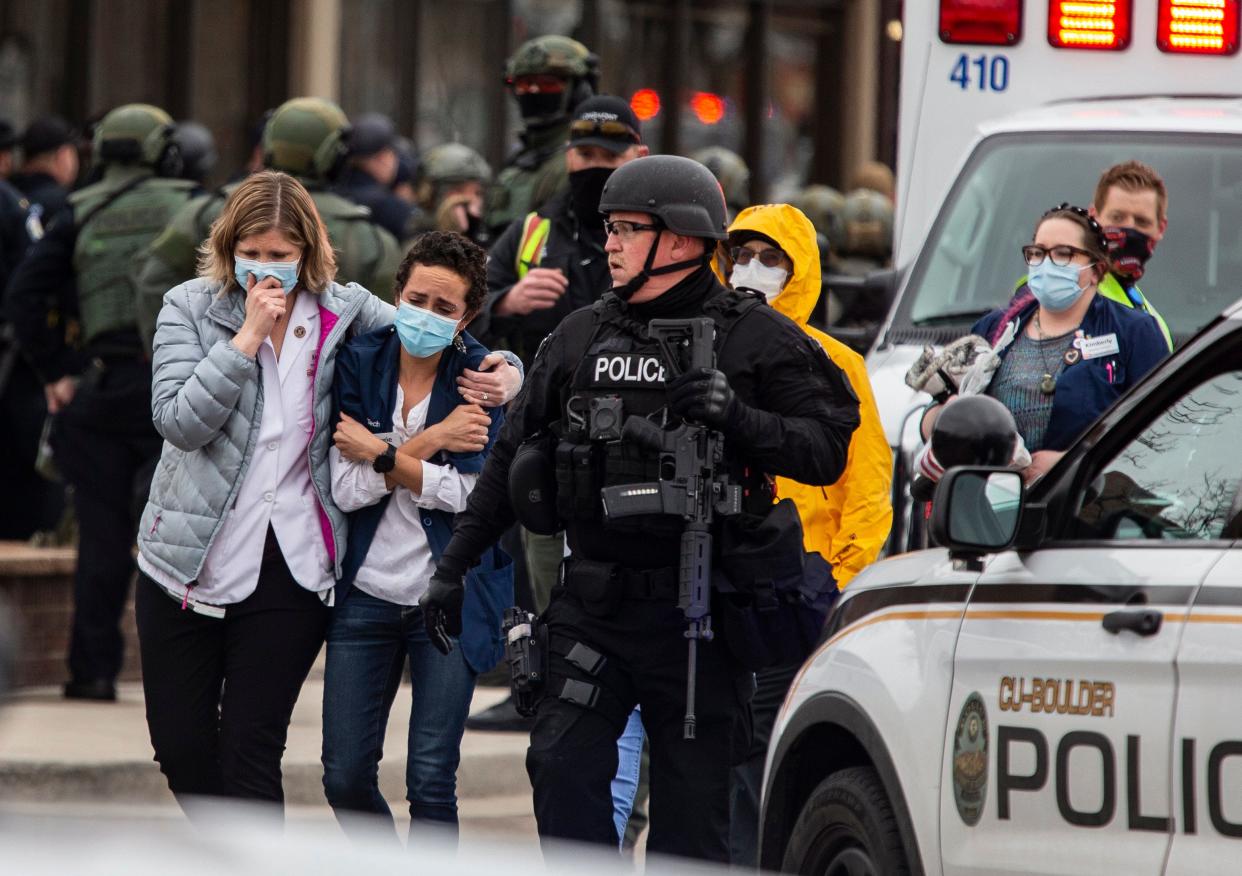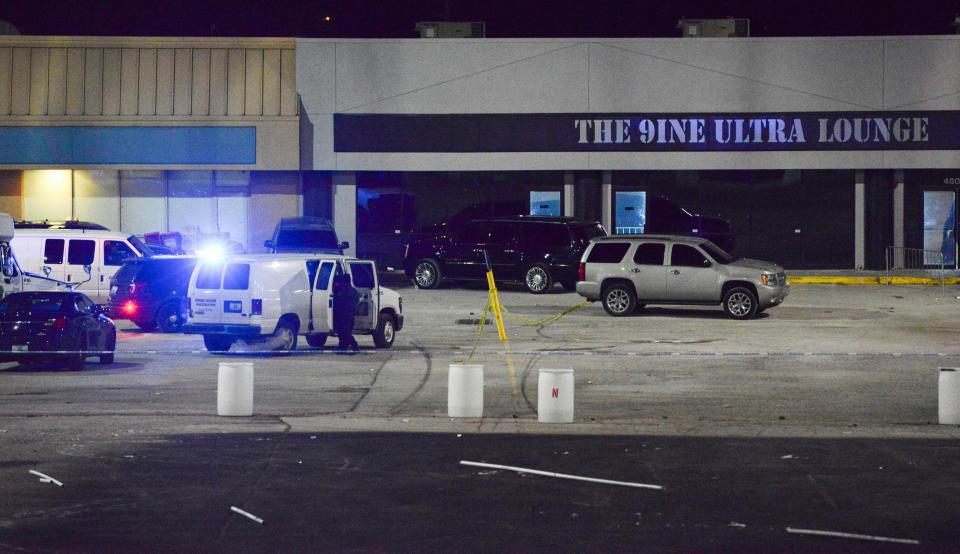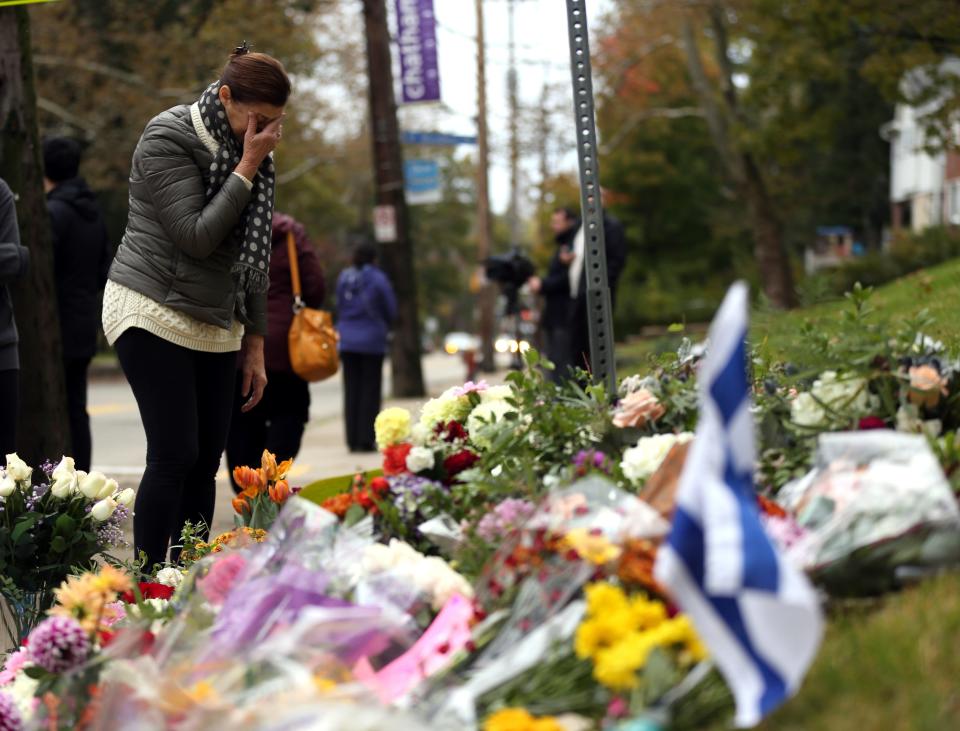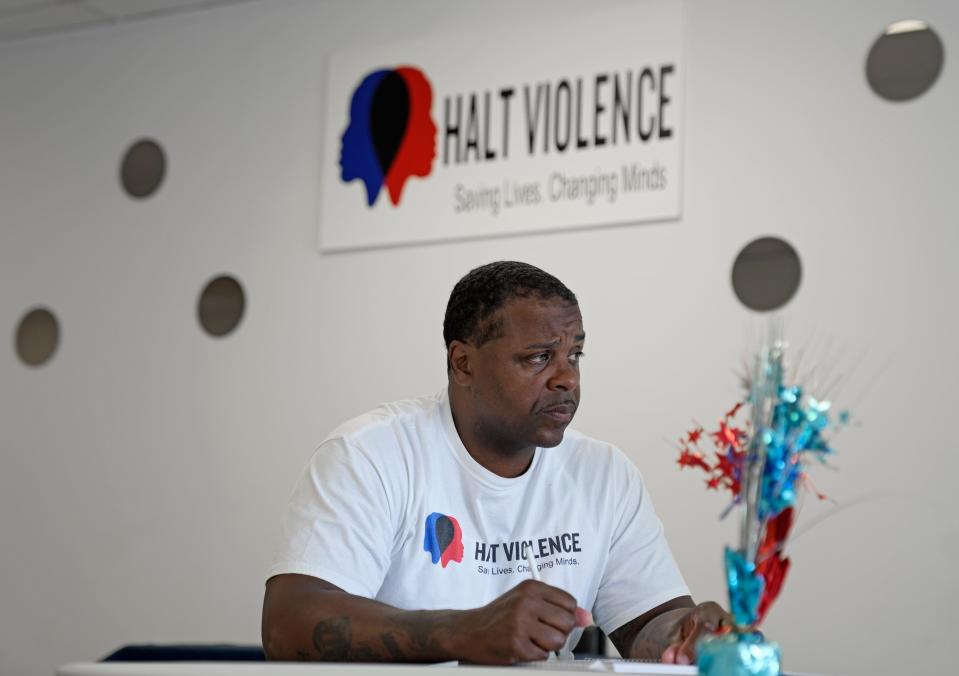Columbus, other cities battling state legislatures in efforts to control gun violence

- Oops!Something went wrong.Please try again later.
Editor's note: This story has be updated to correct that it was Buckeye Institute that filed a legal challenge in Delaware County concerning Columbus gun ordinances.
Cities across the United States including Columbus have been trying to address gun violence by battling with their states for the authority to regulate firearms. So far, however, there have been more defeats than victories.
A Colorado judge ruled on March 12, 2021, that the city of Boulder couldn't enforce a local assault weapons ban because it conflicted with the state's gun "preemption" law, which bans or severely restricts what local municipalities can regulate when it comes to firearms.
Ten days later, Ahmad Al Aliwi Al-Issa, 21, walked into the King Soopers supermarket in Boulder with an AR-556 assault-style rifle and opened fire. Ten people were killed, including a police officer.
What happened next from the state legislature deviated from the usual expressions of thoughts and prayers for the victims and their families. Within months, Colorado lawmakers in a rare move had gutted the state's preemption law, handing the issue of combatting rising gun violence largely back to cities.

Despite pledges to do something by Ohio Gov. Mike DeWine, what happened in Colorado did not occur in Ohio in the aftermath of the Aug. 4, 2019, mass shooting in which 24-year-old Connor Betts shot and killed nine people, including his sister, and wounded 17 in Dayton's Oregon District before being shot by police just over 30 seconds after opening fire.
In fact, Ohio's Republican-controlled government has continued to oppose any attempts to challenge its preemption law. The law came under the spotlight again last November when a Franklin County Common Pleas Court judge sided with the city of Columbus by ruling the state's law unconstitutional, setting off an ongoing legal battle. On Aug. 16, Ohio's Tenth District (Franklin County) Court of Appeals overturned that judge's decision, saying it was based off old evidence and sent the matter back to the judge for further proceedings.
Cities try different legal tactics to regulate firearms
Like Columbus, cities across the United States — including Philadelphia, Detroit, Tucson, Pittsburgh, Seattle, St. Louis and Kansas City, Missouri; Missoula, Montana; Miami Beach and others — have been trying different legal tactics to pry back authority to regulate firearms from their states, with officials saying that gun violence is taking a deadly toll.
“All of us are tired of it,” said Quinton Lucas, mayor of Kansas City, Missouri. “If the state attorney general wants to file suits, then so be it.”
On Aug. 1, Lucas proposed two new local gun laws: One would prohibit anyone younger than 18 from buying ammunition without parental consent, while the other would ban "Glock switches," devices that transform handguns from semiautomatic into automatic weapons, turning recent shootings into "spraying types of situations." Glock switches have surged in popularity among Columbus criminals and police report they're finding them more and more.
Under Fire Series: Glock switches on Columbus streets: Here's how the tiny devices pose an outsized threat

The proposed legislation comes after three people died and another nine were injured when they were sprayed with bullets in a shooting at an illegal Kansas City nightclub.
As of Aug. 2, Kansas City, a city of 509,297, had 117 homicides, with 91% of those by firearms, Lucas said. By comparison, Columbus, a city of 907,971, had 93 homicides as of that date and now has more than 100 homicides. About 90% of Columbus homicides are the result of gunshot wounds, based on statistics released Monday by the Columbus Division of Police.
Despite the potential of legal challenges from the state, Lucas said his city has to do something to try and stem the gun violence.
On the other side of Missouri, the St. Louis Board of Aldermen approved an ordinance in July prohibiting minors from openly carrying firearms through the roundabout tactic of requiring concealed carry permits to open carry because the age requirement for a concealed carry permit is 19.
“In St. Louis, we have a proliferation of guns,” St. Louis Alderwoman Cara Spencer said. “Kids are walking around with AR-15s, and police can do nothing. ... I have spoken to tons of police officers who say thank you (for the new ordinance)." According to St. Louis police, that city, population 286,578, has seen 98 homicides this year as of Aug. 16.
In June, one teenager was killed and 11 others were injured in a shooting in downtown St. Louis. One juvenile, a 16-year-old boy, was arrested in early August in connection to the crime.
This past Tuesday, St. Louis Mayor Tishaura Jones said she would be introducing legislation that would ban AR-15s, AK-47s and similar military-style weapons. The legislation also would prohibit the transfer or sale of guns to minors and forbid anyone convicted of hate crimes or insurrection from having firearms.
Pittsburgh, a city of 302,971 with 30 homicides as of Aug. 17, passed its own gun laws in 2019 in an attempt to ban military-style assault weapons after the mass shooting in 2018 at the Tree of Life synagogue that killed 11 in the city's Squirrel Hill neighborhood. But lower state courts have blocked Pittsburgh, citing Pennsylvania law that preempts local government from trying to regulate guns. The city has appealed to the Pennsylvania Supreme Court and the case is still pending.

According to the Giffords Law Center to Prevent Gun Violence, just five states — Connecticut, Hawaii, Massachusetts, New Jersey, and New York — have no state laws expressly preempting local authority to regulate firearms or ammunition. Two others, California and Colorado, allow local governments to retain some authority. And cities in those states have been using their authority to pass local codes.
In California, 39 localities require gun dealers to have liability insurance, 33 jurisdictions prohibit gun dealers from operating near areas where there are high concentrations of children, and 143 jurisdictions either regulate or prohibit firearms and/or ammunition on some types of public property, such as municipal buildings, parks, and recreation areas, according to the center.
In Boulder, a Colorado Senate committee had forwarded legislation to broadly repeal the state's preemption law within two months of the King Soopers shooting, declaring firearm regulation a matter of both "state and local concern." By June 2021, Gov. Jared Polis, a Democrat, had signed the law repealing the preemption statute, which had been in place since 2003.
“It became quite apparent to people that we had a problem with the preemption," said Eileen McCarron, spokesperson for the gun-violence prevention group Colorado Ceasefire.
Supreme Court rules that government must demonstrate that gun regulation is consistent with "historical tradition"
But city and state officials across the country are now eying a U.S. Supreme Court ruling issued in June 2022 in New York State Rifle & Pistol Association Inc. v. (Kenneth P.) Bruen (superintendent of New York State Police), which struck down New York State's conceal-carry licensure statute as a violation of the Second and Fourteenth Amendments giving people the right to carry a loaded handgun in public for self-defense. The nation's highest court ruled 6-3 that the government must demonstrate that gun regulation is consistent "with this nation's historical tradition."

That Supreme Court ruling noted that justices had surveyed "English history dating from the late 1600s, along with American colonial views leading up to the founding," and concluded that the Second Amendment presumptively guarantees people the right to "bear" arms, or carry guns in public, for self-defense, although not completely without limits.
Many people wouldn't be shocked to learn that there weren't many laws in the 1600s and 1700s prohibiting felons, the mentally ill or domestic abusers from possessing guns, but "there were laws banning African Americans from possessing firearms," said Adam Winkler, a professor of law at UCLA with expertise in Second Amendment constitutional law and the author of “Gunfight: The Battle Over the Right to Bear Arms in America."
For gun-rights groups led by the National Rifle Association, preempting local restrictions is a cornerstone of their decades-long political strategy. "... In their view, we’re talking about a fundamental constitutional right" that shouldn't vary based on what city you're in, Winkler said.
But mass shootings have "happened so many places now, you would think that’s impacted virtually all of us, (and) there would be, no matter what side of the political aisle you’re on, a thirst for keeping our kids safe and feeling like you could go to grocery stores and bakeries and sporting events, and feel like you’re in a safe place," said Rachel Friend, a Boulder City Council member.
"And for whatever reason, the powers that be just won’t let us have it.”
The other side of the issue: Republican leaders weigh in
Dean Rieck, executive director of the Buckeye Firearms Association, a gun-rights advocacy group, said Columbus is wasting taxpayer dollars with its legal challenges to the state's preemption law, noting the GOP-controlled Ohio Supreme Court has twice upheld the law's validity.

"Both times (the Ohio Supreme Court has) ruled that firearm preemption is valid law in all aspects," Rieck said. He added that local control makes no more sense when it comes to a "patchwork" of gun laws than it would if cities could choose what color meant "stop" on a traffic light.
Ohio's gun laws: Ohio has long history with strict gun regulations predating Civil War
After heavy lobbying by gun-rights groups, Ohio's gun-preemption statute took effect in 2007, effectively taking away cities' constitutional "home rule" powers dealing with guns, including those dealing with types of weapons, magazine capacity, safe storage, sales, and where guns can legally be carried.
The Ohio Revised Code in its current, amended expanded language “preempts, supersedes, and declares null and void any such further (gun) license, permission, restriction, delay or process,” dealing with “ownership, possession, purchase, other acquisition, transport, storage, carrying, sale, other transfer, manufacture, taxation, keeping, and reporting of loss or theft of firearms, their components, and their ammunition.”
Only the U.S. and Ohio constitutions, and state and federal law, can set gun restrictions, state law now says, and both affirm the right to keep and bear arms.
Ohio Attorney General Dave Yost, a Republican, said he has to enforce the law that's on the books, and there are issues that require a uniform statewide standard, such as gun laws. It doesn't make sense to have a checkerboard of gun laws across the state, Yost said, noting that part of Columbus is in Delaware County, and someone driving on Polaris Parkway could comply with the law in Orange Township, then "suddenly become a criminal" once entering Columbus.
Gov. Mike DeWine declined through a spokesman to speak to The Dispatch for this story. His office issued this written statement: “Governor DeWine still believes the most important thing we can do to reduce gun violence is to target repeat violent offenders, who already cannot legally possess a firearm and whom statistics have shown commit a significant portion of gun crimes, with longer sentences to take them off the streets and prevent further gun crimes from happening.”
Ohio Senate President Matt Huffman, a Republican from Lima, said the Ohio Constitution says that all citizens have the right to bear arms for their self-defense.
Huffman said that while ignorance of the law is no excuse, he said it would be confusing for people who travel through jurisdictions to keep track of gun laws in each.
"I’m allowed to do this in my hometown, but driving in Columbus it’s different?" he said.
Thell Robinson III, founder and CEO of the Halt Violence group in Columbus, said he is skeptical that local gun laws would make a difference. “If a person has cash, they can get a gun," Robinson said. "There’s no law that can stop it. Anybody that knows what’s going on, they know that.”

Nationally, the state-by-state preemption effort has been led by the NRA, sparked by what happened in a tiny Chicago suburb. Morton Grove, Illinois, made history in 1981 by becoming the first municipality in the nation to outright ban the possession of handguns anywhere, even in homes, said Andrew Willinger, executive director of the Duke Center for Firearms Law.
“As a result, the NRA sort of throws its support behind these state preemption laws as a way of preventing cities and towns from doing what that town in Illinois did, which is regulating firearms more stringently than the state," Willinger said. "That campaign was incredibly effective."
In fact, after appeals led the U.S. Supreme Court in 2008 to affirm homeowners' rights to keep guns for self-defense, Morton Grove repealed its ban along with some other Illinois towns.
Rieck doesn't question that gun crime varies in intensity by location.
"The big cities, that's where your violent crime problem tends to be," Rieck said. "And rather than deal with that directly, they want to pass (additional local) laws," while studies have shown that a large proportion of gun crimes are the result of a small number of criminals "running rampant."
Those criminals should simply be arrested under existing laws, Rieck said. Making new gun laws "is not going to solve the problem," he said, because violent criminals will simply ignore them.
Preemption keeps local governments from turning responsible gun owners into criminals, by getting caught up in a maze of varying local regulations as they travel, he said.
Rieck said the Buckeye Firearms Association isn't necessarily against some of what Columbus city officials want to require, like safely storing guns in places where kids are present, believing it to be a sound practice. But it doesn't think cities have the power to mandate it in Ohio, only the state does.
And his group isn't lobbying the state to create such a requirement, Rieck said. The same applies to gun training, which is smart but shouldn't be required, he said.
"We're not pushing for it. We just don't believe in those kinds of mandates."
'... Columbus ain't Troy': Ohio Constitution gives cities broad powers to solve local problems locally
Those in favor of permitting local gun laws argue that gun violence ultimately boils down to a local issue, with the severity of the problem varying greatly from city to city, even neighborhood to neighborhood, defying states' one-size-fits-all laws. That was why Ohioans amended the state Constitution in 1912 to give city's broad powers to solve local problems locally, they argue.
“Cleveland ain’t Waverly, and Columbus ain’t Troy,” said Mike Curtin, a former Democratic member of the Ohio House of Representatives and, before that, a former publisher of The Dispatch, and an Ohio political historian. “They’re very, very different circumstances."

In November 2022, Franklin County Judge Stephen L. McIntosh agreed with Columbus that the state's gun preemption law was an “unconstitutional infringement upon municipal home rule," setting off two different appeals.
The 10th District Court of Appeals overturned McIntosh's ruling on Aug. 16, saying he based his decision on old information. Ohio Attorney General Dave Yost called the ruling a victory; Columbus City Attorney Zach Klein called it procedural and noted the case was returned to the judge.
In the second appeal, filed by the Buckeye Institute on behalf of unnamed gunowners, a Delaware County judge halted enforcement of three Columbus ordinances:
Criminalizing having a deadly weapon unsecured in a home where a child could access it
Banning large capacity magazines that can hold 30 or more rounds
Prohibiting the selling or giving of a firearm to another person who can't legally possess it
"Preemption has really handcuffed what we can do here at the local level,” said Columbus City Council member Shayla Favor, who sponsored the three gun ordinances that the council passed in December and are now in limbo. “We should have the autonomy to do what we need to do.”
Columbus City Attorney Zach Klein said "red state" politics is creating gun chaos in Ohio's big cities.

"People are getting killed, and there are reasonable things that we can do to make a difference," Klein said. But the Supreme Court's new Bruen decision has led Yost to recently argue in court against the Columbus safe-storage ordinance that there was no such thing during the Civil War, Klein said.
Yost "is saying that the reason why we’re violating (the Constitution) is because kids were allowed to have guns during the Civil War, so they should have access to guns now," Klein said. "And so he’s taking the U.S. Supreme Court’s new test, where you go to history and tradition and go back to 1776 and figure out what George Washington was thinking. He’s asking the court — all the trial courts he’s participating in — to erase the reasonableness standard."
In an emailed statement, Yost spokeswoman Bethany McCorkle said: "In its Bruen decision the U.S. Supreme Court held that only those firearm regulations that are consistent with American history and tradition may stand in light of the right to bear arms. Thus, we are now required to look back in history to determine whether a firearm regulation violates the right to bear arms today. That is now the standard."
In February, the Cincinnati City Council passed ordinances requiring the safe storage of firearms to keep them away from children and barring those convicted of domestic violence or subject to a protection order from possessing firearms.
The council also filed suit against the state of Ohio, stating the COVID-19 pandemic brought a surge of gun violence to that city, with 488 shooting victims in 2020, another 413 in 2021, and 411 in 2022. That compares to 356 in pre-pandemic 2019. Cincinnati passed a safe-storage ordinance and one allowing for local enforcement of a federal ban on people with domestic violence convictions possessing firearms, around the same time as the lawsuit was filed.
"The City of Cincinnati desires to enact common-sense gun legislation and undertake other actions that are within its home rule authority to reduce the risk and harm of gun violence ...," the complaint says. "The mayor and certain members of Council wish to speak freely on issues of gun regulation, including their desire to impose licenses, permissions, restrictions, delays, or processes affecting guns beyond those provided by state and federal law."
Cincinnati, a city of 309,153, had 42 homicides as of Aug. 14 and 212 shootings as of Aug. 13.
Democrats in the Republican gerrymandered Ohio legislature have also been stymied. Their measures have gotten nowhere.
Rep. Cecil Thomas, a Cincinnati Democrat, cosponsored legislation in 2022 that would have raised the age to buy a long gun rifle in the city from 18 to 21, and enact red flag laws for those having mental health issues. But it was a no go.
"It’s frustrating, first of all, at the legislative level to endure this kind of overreach," said Thomas, a former Cincinnati city council member. "It's a matter of our communities trying to govern themselves. They know what their needs are, especially when it comes to violence in their streets."
Rep. Dontavius Jarrells, a Columbus Democrat, introduced a bill to give municipalities the ability to control firearms and ammunition. It received only one hearing in the state House in 2022.
"When you’re in a rural community, when the pastime is going to shoot when you're hunting, it's a different mindset with guns than if you live in the urban core," Jarrells said.
One family's story: Columbus East Side neighborhood shows impact of gun-related crime

Almost nowhere in Columbus has fared worse in the epidemic of gun-related crime than the neighborhood on the East Side where Keisha Riley lives.
In that roughly 2-square-mile area, there have been 2,600 gun-related calls to 911 from January 2021 through June 2023, including 19 homicides and scores of confirmed shootings.
Riley said she knows people whose loved ones have been shot or even killed, and she doesn't walk at night because of the frequent gunshots she hears. Neighboring houses and apartments have been shot at, and many of their occupants now carry guns to protect themselves, setting up a deadly standoff between “people on defense, and the people on offense,” she said.
“They’re getting younger and younger, and everybody has a gun now,” even kids as young as 13 and 14 walk her streets with concealed firearms, she said. "... Every other day is a shooting.”
Riley's neighborhood, between Bexley and Whitehall, is home to Columbus Division of Police Cruiser Districts 90 and 91, which rank No. 2 and No. 3 in the city in gun-related 911 calls, averaging more than 1,300 between January 2021 and June 2023.
That’s about 20 times higher than a cruiser district in Clintonville along the Scioto River, which had only 66 similar gun-related 911 reports during that same time span, including five confirmed shootings — the lowest number in the city. The median number of gun calls across the city's 102 cruiser districts was 467.
"We have no such concerns or worries," said Hugh Crowell, 65, a Clintonville resident who sits on its area commission. "We don't have any hesitation to go out walking at any time of day. ... We don't hear gunshots at all."
Around 2 p.m. May 21, 2021, Riley's son died as a result of gun violence. He was fatally shot in the back seat of a car in front of a bowling alley near Route 161 and Cleveland Avenue. Witnesses told police they saw two males drive up in a gold Ford Explorer, open fire, and speed off.
Keishawn Riley, 29, died at the hospital. He had three kids, his mother said. A 17-year-old, Ellis Caldwell, was arrested by SWAT officers last spring and charged with murder and felony assault in the shooting. Riley said she doesn't know what the motive was for the shooting.
“My son didn’t carry a gun," Riley said. "He had no gun on him. He had a job. He worked. You know, he may have befriended the (wrong) person. But at the same time, to me, it boils down to the guns."
wbush@gannett.com
@ReporterBush
mferench@dispatch.com
@MarkFerenchik
This article originally appeared on The Columbus Dispatch: Gun advocates say state preemption prevents patchwork of city laws

